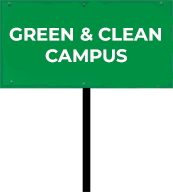
ABOUT THE DEPARTMENT
Initiation and Brief Overview
Mathematics as a subject was introduced at the undergraduate level in Ramakrishna Sarada Mission Vivekananda Vidyabhavan from 1962.Students of the Department participate in open book tests, group discussions, assignments and PowerPoint presentations. At present, the Mathematics Department has a two-member faculty with one SACT teacher and one monastic faculty.
Vision and outlook
We try to make our students aware about the curriculum which strives to equip them with the knowledge, skills, and habits of mind that are essential to understanding and enjoying the importance and beauty of mathematics. As students engage with the curriculum, they may incorporate their prior experience and existing mathematical understanding, and then integrate the new ideas they learn into their daily lives.We focus on providing mathematical confidence and overall development of our students so that they make connections to other subjects, explore the world, and later pursue further studies.
Methods of teaching
Board work is very important for this subject.
Apart from classroom lectures or the chalk and talk method, the Department uses ICT based classes such as PowerPoint presentations, to stimulate learning interests.
To enhance their learning interest Movies related Mathematics & Mathematicians are shown in the computer.
Regular assessments through written classwork and class-tests ensure that the students are well prepared for their final end-semester examinations.
Infrastructure
The Department has its own sitting room for the teachers and a library for both the teachers and the students.
Email: mathematics@rksmvv.ac.in
Courses offered
Minor
Syllabus For NEP
https://wbsu.ac.in/web/wp-content/uploads/2024/01/MATH_SEM-I_II_Modified_Syllabus.pdf
Programme Outcomes:
PO1 Knowledge & Application
PO2 Communication Skills
PO3 Social Responsibility
PO4 Critical, logical and rational thinking
PO5 Enlightened and effective Citizenship
PO6 Values & Ethics
PO7 Sustainable development
PO8 Life-long process of Learning
PO9 Employment Skills
Programme Specific Outcomes:
PSO1: Widening of the knowledge base & skills.
PSO2: Gaining new knowledge & skills.
PSO3: Undertaking future studies
PSO4: Performing well in a chosen career
PSO5: Playing a constructive role as a responsible citizen in the society
PSO6: Build a mathematical concept for new areas of life-problems.
Paper Name & Course Outcomes:
For NEP: (Course Offered-Minor)
Semester – 1:
MIN1 (MTMMIN101T): Algebra: Algebra is faster than Basic Maths. It helps to solve problems quickly & easily. It also opens up whole new areas of life problems such as graphing curves. It reinforces logical thinking. It is necessary to master Statistics & Calculus.
Semester-2:
MIN2 (MTMMIN102T): Calculus: Calculus is used to find the rate of change of a quantity w.r.t. others ,the maximum & minimum value of a curve, the approximate value of small change in a quantity. Real-life applications of differential calculus are calculations of profit-loss w.r.t. business using graphs, rate of change of temperature, distance-speed problems & to derive many physics equations.
For CBCS Course:
Sem-1:
MTMGCOR01T: Differential calculus: Students will be able to verify the value of the limit of a function at a point, identify a continuous curve & understand the difference between the limit & continuity of a function at a point, show whether a function is differentiable at a point.
Sem-2:
MTMGCOR02T:Differential Equations :to be familiar with concept of order ,degree of a differential equation ,distinguish between linear, non-linear, ordinary & partial differential equations, acquainted with various methods of solving mainly 1st order & 2nd order ode & pde , interpret the difference between the general & particular solutions, understand the applications of differential equations.
Sem-3:
MTMGCOR03T: Real Analysis: to understand the number system & point set theory, know the basic postulates of real numbers, get the knowledge of sequence & series of real numbers, recognize the difference between point-wise & uniform convergence of sequence & series of functions, familiar with concepts of power series ,radius of convergence.
Sem-4:
MTMGCOR04T: Algebra: acquire knowledge of the concepts of sets, relations, mappings & their types, working knowledge of important mathematical concepts like groups & subgroups , introduce to the mathematical concepts of rings , zero divisors ,integral domain, fields & their properties.
After completion of the course students will be able to:
| Cos | Knowledge level
Bloom’s Taxonomy |
POs mapping | PSOs mapping | |
| For NEP:
CO MIN1 |
Algebra is faster than Basic Maths. It helps to solve problems quickly & easily. It also opens up whole new areas of life problems such as graphing curves. It reinforces logical thinking. It is necessary to master Statistics & Calculus.
|
Understand, analyse, interpret, identify, factor , picture graphically, classify, construct, determine, examine ,exercise | 1,2,3,4,5,8,9 | 1,2,3,4,5,6 |
| CO MIN2 MTMMIN102T |
Calculus is used to find the rate of change of a quantity w.r.t. others, the maximum & minimum value of a curve, the approximate value of small change in a quantity. Real-life applications of differential calculus are calculations of profit-loss w.r.t. business using graphs, rate of change of temperature, distance-speed problems & to derive many physics equations.
|
Understand, know, state, differentiate, classify, interpret, change, derive, explain, maximize, minimize, generalize, determine, verify | 1,2,3,5,8,9 | 1,2,3,4,5,6 |
| For CBCS:
CO MTMGCOR01T |
Students will be able to verify the value of the limit of a function at a point, identify a continuous curve & understand the difference between the limit & continuity of a function at a point, show whether a function is differentiable at a point.
|
Know, understand, differentiate, evaluate, illustrate, determine, justify, verify, point, classify, construct, test | 1,4,6,7,8 | 1,2,3,4,6 |
| CO MTMGCOR02T | be familiar with concept of order ,degree of a differential equation ,distinguish between linear, non-linear, ordinary & partial differential equations, acquainted with various methods of solving mainly 1st order & 2nd order ode & pde , interpret the difference between the general & particular solutions, understand the applications of differential equations.
|
Know, differentiate, evaluate, examine, determine, justify, verify, classify, test | 1,2,3,4,5,7,8,9 | 1,2,3,4,5,6 |
| CO MTMGCOR03T | to understand the number system & point set theory, know the basic postulates of real numbers ,get the knowledge of sequence & series of real numbers, recognize the difference between point-wise & uniform convergence of sequence & series of functions, familiar with concepts of power series ,radius of convergence.
|
Know, analyse, explain , formulate, justify | 1,4,6,7,8 | 1,2,3,4,6 |
| CO MTMGCOR04T | acquire knowledge of the concepts of sets, relations, mappings & their types, working knowledge of important mathematical concepts like groups & subgroups , introduce to the mathematical concepts of rings, zero divisors ,integral domain, fields & their properties. | Know, abstract, analyse, define, characterise, group, associate, identify, examine, determine ,verify | 1,4,6,7,8 | 1,2,3,4,5,6 |
PO, CO Matrix:
| PO1 | PO2 | PO3 | PO4 | PO5 | PO6 | PO7 | PO8 | PO9 | |
| CO MIN1 | |||||||||
| CO MIN2 | |||||||||
| CO MTMGCOR01T | |||||||||
| CO MTMGCOR02T | |||||||||
| CO MTMGCOR03T | |||||||||
| CO MTMGCOR04T |

Monastic Faculty
View Profile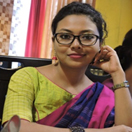
SACT
View Profile| Routine | Download |
| DEPARTMENTAL ROUTINE ODD AND EVEN (2019-2023) | View |
| Lesson Plan | Download |
| LESSION PLAN sem 1 2023 NEP | View |
| Lesson Plan of Sem 3 2023 CBCS | View |
| lesson plan-sem1 2019 | View |
| lesson plan-sem1 2020 | View |
| lesson plan-sem1 2021 | View |
| lesson plan-sem1 2022 | View |
| lesson plan-sem2 2019 | View |
| lesson plan-sem2 2020 | View |
| lesson plan-sem2 2021 | View |
| lesson plan-sem2 2022 | View |
| lesson plan-sem2 2023 | View |
Mathematics Department uses the following methods of continuous evaluation to judge students learning & understanding of the study materials taught in the classes:
1.Tests: It is a most popular tool for collecting data for our student’s evaluation. We conduct three types of tests.
2.Questionnaire: A systematic compilation of questions are formed to judge the students understanding of the topic.
3.Assignment
4.Self reporting techniques: Our students provide information about their feelings, cognitions (i.e. Thoughts) & weaknesses on the topics taught in the classes. Thus, after disclosing themselves to us we try to explain them the topic more easily & interestingly.
Apart from these regular classwork, homework & assessment tests are also major part of this continues evaluation process.
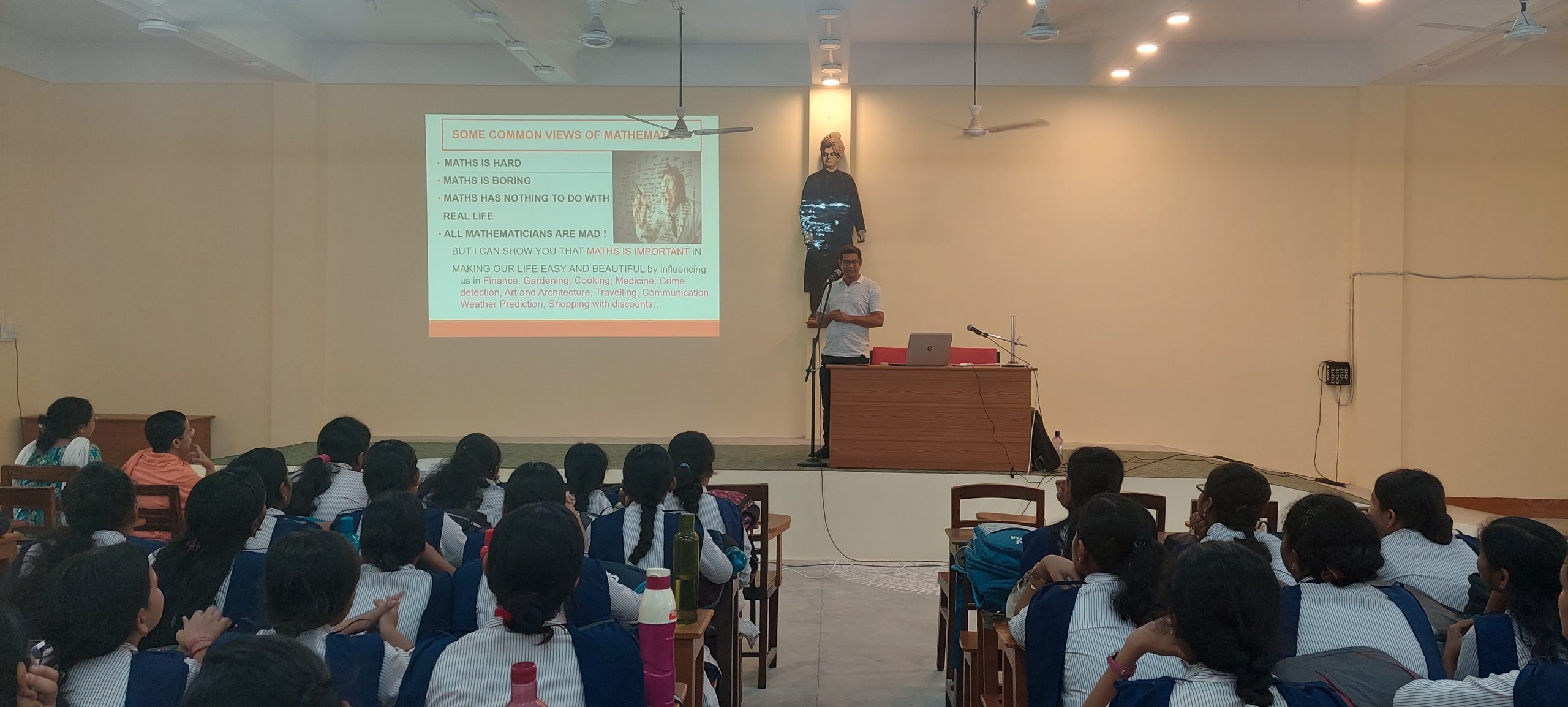
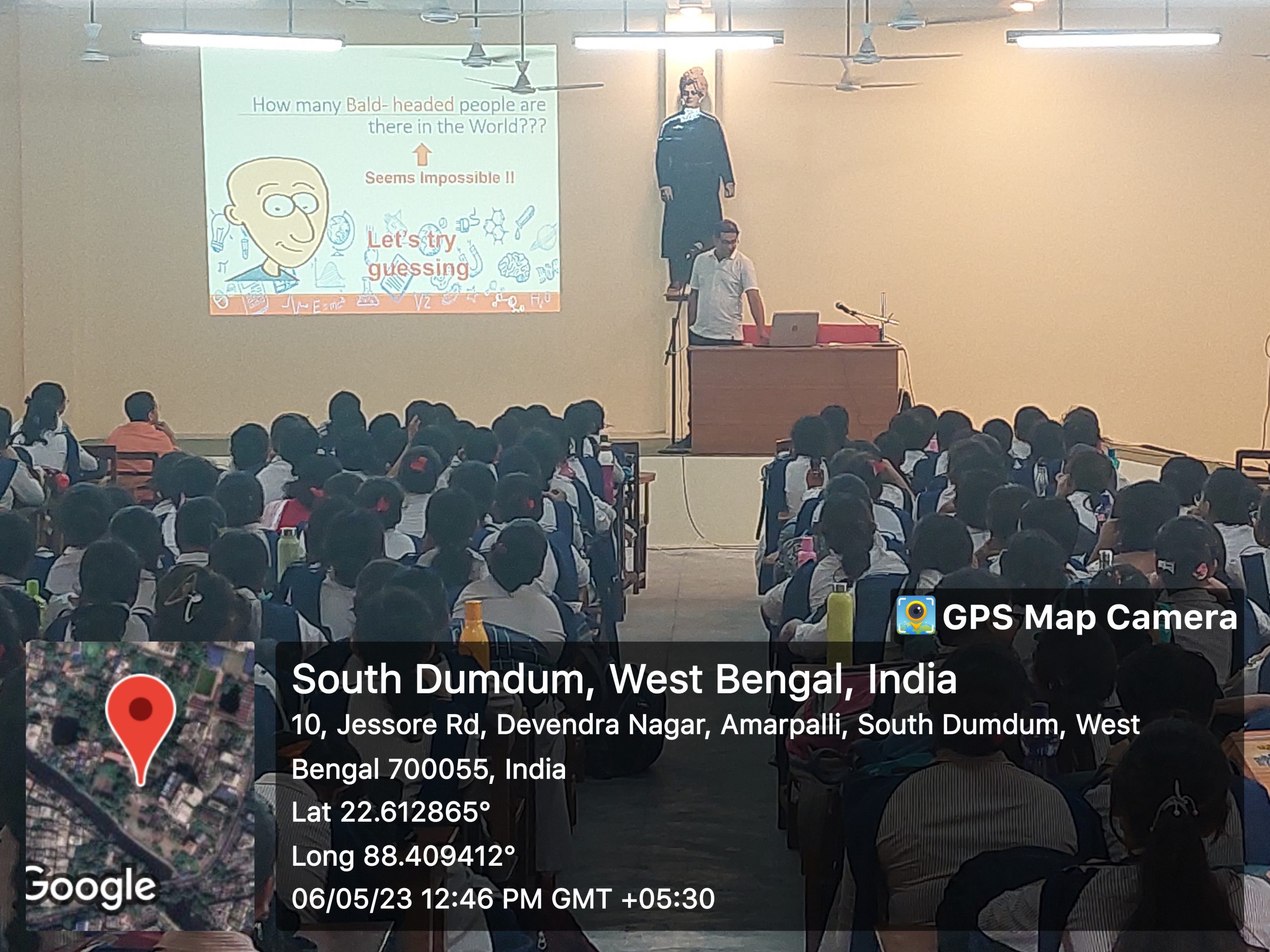
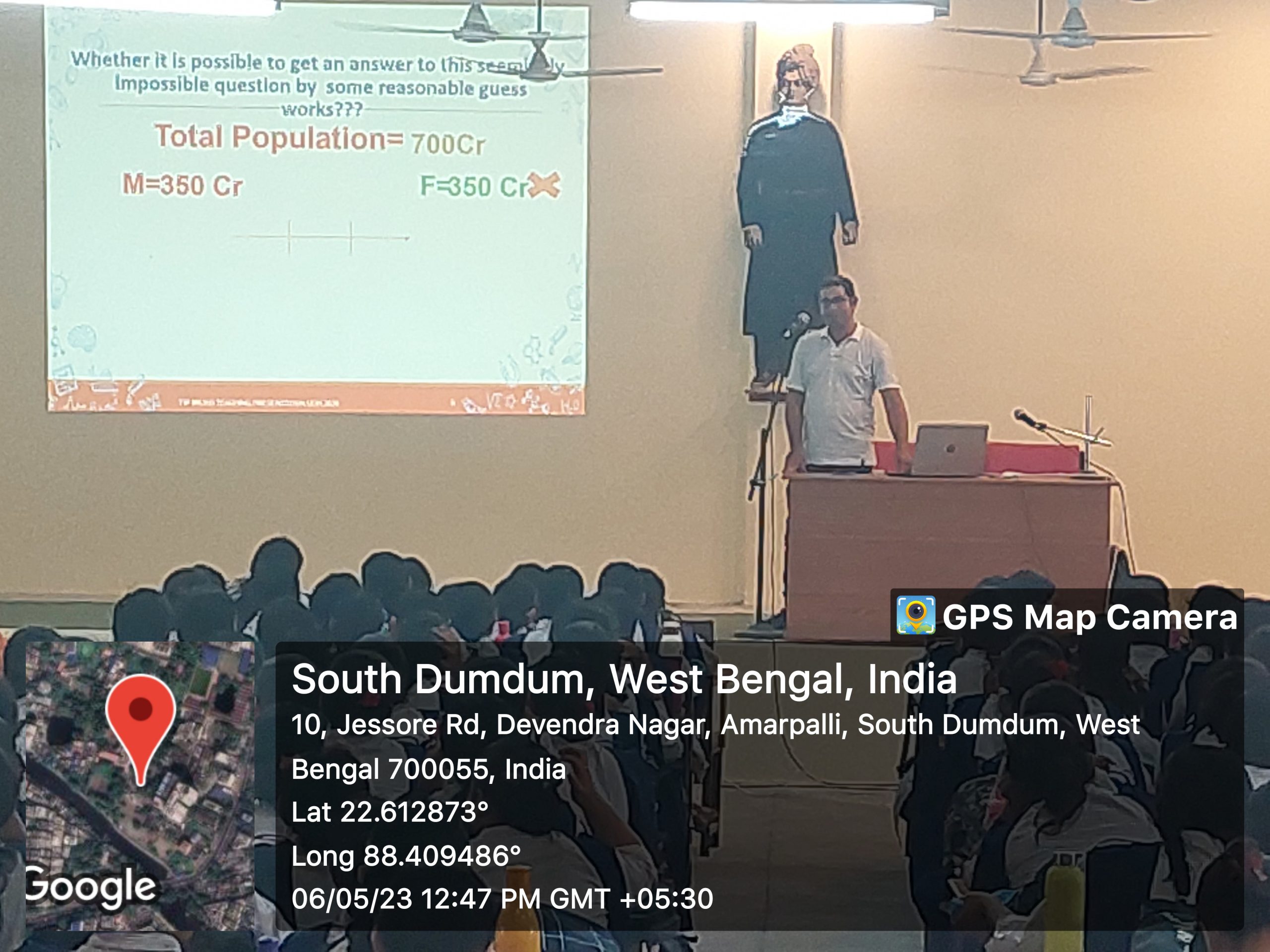
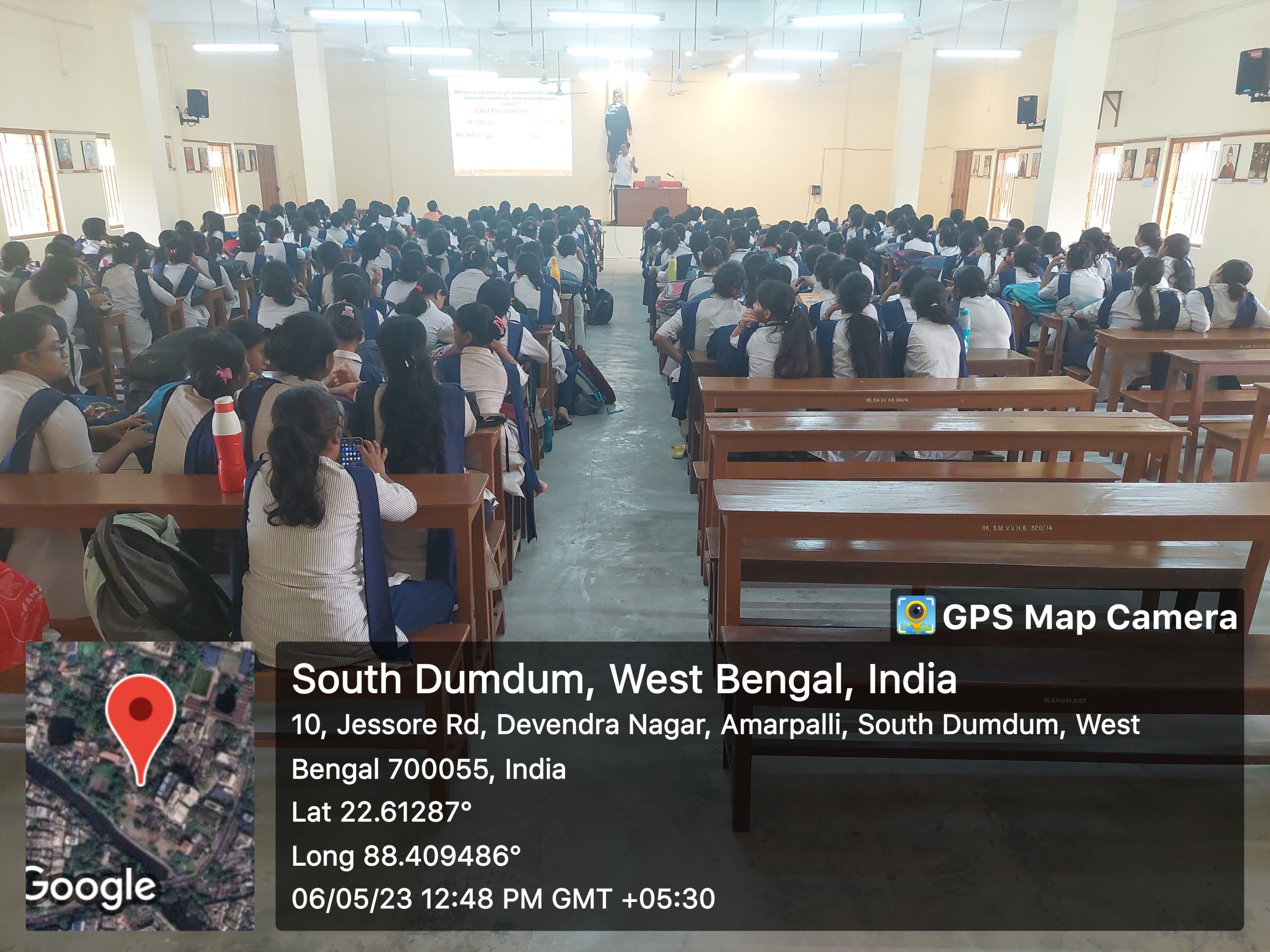
Name of activity: Extention Lecture
Category: Extention Lecture
Topic: Mathematics in Daily Life
Organising unit: Mathematics Dept.
Date: 06.05.23
Time: 12:30p.m. to 1:30p.m.
Venue: Swamiji Bhavan
Name of resource person/s (with designation) : Dr.Kalyan Brata Chatterjee;Asst.Prof.Dept.of Physics,RKM Vivekananda Centenary College,Rahara.
Number of participants: All Students
Breif description of event and Programme outcome:
The students are made aware with different examples of how mathematics helps us in many ways in our daily life.They were informed with examples that how maths is involved in figuring out distance ,time& cost for travel;understanding loans for cars,trucks,homes etc.;shopping for the best price;balancing the checkbook;understanding sports results & statstics; preparing food;household budgeting;playing an instrument;crafts such as sewing etc.It was also discused that how our universe can be understood through the language of mathematics.The world is interconnected,everyday maths shows these connections & possibilities.In todays time,it is impossible to live without mathematics.The Golden Ratio which is needed to achieve symmetry & beauty was discussed. A person is thought to be attractive if the length of their face divided by the width of their face equals was also explained by mathematics on that day.
The interest of the students in maths has increased noticeably and the seats are filled as soon as the portal is opened in the next value add on course on Mathematics in Daily Life. Arts based students have taken classes very attentively. Everyone has done all class work, home work and assignments with great interest. Most of the students got very good marks in the final evaluation.
The Mathematics department offers general course for CBCS system and minor course for new NEP system to the students. As education is fundamental right, the institution practices significant strategies and scientific techniques to benefit both the advanced learners and slow learners in the college. Advanced Learners are those students who are ahead on the learning curve and are identified based on the performance in class room, class test and end-sem exam. They are more potential with their comprehension, retention, memory, critical thinking, problem solving ability. These students are in a great extend gifted and talented than the others in the class. These students can take up higher level learning and academic responsibilities. They can bring some new concepts, method and strategies for solving problem, and also can take the leadership in the teaching learning activities. To meet the advanced technical know-how of advanced students following special activities are conducted –
• i. Individual academic counselling for carrier planning is done by concerned subject teacher
• ii. Doubt clearance session after classroom session
• iii. Guiding the students for JAM, NET and other Competitive Examinations.
Slow learners are those who find it difficult to understand the lessons and may have difficulties in their
comprehension, retention, reproduction and integration. They lag behind with the academic life. They
may fail in exams or will score only poor grades. They may fail in articulations and critical reflections.
Their motivation levels also may be poor and may find it difficult to adjust with the teaching learning
process. The poor performance may not be a sign of the poor capacity or talent but may be due to
inappropriate teaching methods, poor family situations, inadequate motivations and supports,
unscientific learning practices or even the inability to converse in an unfamiliar language. These
students need special attention and interventions to make their learning activity more enriching and
effective. To meet the need of slow learners following special activities are conducted –
• i. They are provided with extra classes for improvement and achievement
• ii. The Department and individual teachers help the slow learners by giving proper guidance
and support to them.
• iii. Organize bridge classes and remedial programmes for them.
• iv. Conduct extra classes for the difficult topic in the curriculum.
• v. Bilingual explanation and discussions are imparted to the slow learners after the class hours
for better understanding.
• vi. Provision of simple and standard lecture notes/course materials
• vii. Getting the support of the advanced learners to the slow learners in making their learning
process more participatory and interesting.
Results
1.Year-2017-2020
| SL.No | Name | 1st Year+2nd year |
| 1 | Ritu Biswas | 127/300 |
| 2 | Dipaboli Ghosh | 156/300 |
| 3 | Ahana | 141/300 |
2.Year-2018-2021
| SL.No | Name | 1st Sem | 2nd Sem |
| 1 | Titi Dutta | 60/75 | 60/75 |
3.Year-2019-2022
| SL.No | Name | 1st Sem | 2ND Sem |
| 1 | Arunima Biswas | 41/75 | 45/75 |
| 2 | Rubi Saha | 70/75 | 45/75 |
4.Year-2020-2023
| SL.No | Name | 1st Sem | 2nd Sem |
| 1 | Supriti Chakraborty | 73/75 | 71/75 |
| 2 | Sohini Sadhukan | 73/75 | 64/75 |
5.Year-2021-2024
| SL.No | Name | 1st Sem | 2nd Sem |
| 1 | Abanti Mukherjee | 68/75 | 65/75 |
6.Year-2022-25
| Sl.no | Name | 1st Sem | 2nd Sem |
| 1 | Parama Das | 35/75 | 53/75 |
Students Progression
| Year | Name | Progression |
| 2017-2020 | Dipaboli Ghosh | after B.sc she purchased M.Sc from West Bengal State University in the year 2020-2022 |
| 2017-2020 | Ritu Biswas | after B.Sc she purchased M.Sc from Calcutta University in the year 2020-2022 |
| 2018-2021 | Titi Dutta | after B.Sc she purchased M.Sc from West Bengal State University in the year 2021-2023 |
| 2019-2022 | Arunima Biawas | after B.Sc she is preparing for CAT examination |
Co-curricular Awards
| Session | Names
|
Rank
|
Event (College Cultural Competition)
|
|
| 2021 | SohiniSadhukhan | 2nd | Bengali recitation | |
| Sukriti Chakraborty | 3rd | Bengali recitation | ||
| SohiniSadhukhan | 3rd | RabindraSangeet | ||
| 2020 | Titi Dutta
|
3rd | Bengali recitation | |
| Arunima Biswas | 1st | Essay writing | ||
| Arunima Biswas | Special prize | Debate | ||
| 2019 | Titi Dutta and DeepabaliGhosh | 3rd | Poster making | |
| Ahana Chakraborty | 2nd | Essay Writing | ||
| Ahana Chakraborty | 3rd | Extempore | ||
| Ritu Biswas | 1st | Painting | ||
| 2018 | Ahana Chakraborty | 2nd | Essay writing | |
| Ahana Chakraborty | 3rd | Extempore | ||
| Ritu Biswas | 3rd | Painting |
Ritu Biswas participated in Group Dance in the UG-PG Inter-College Cultural Competition heldin NabaBallygungeMahavidyalaya on 21-22 February, 2018 and secured 1st position.
Testimonial by Anuradha Dutta
R.K.S.M.V.V is a place where I have discovered myself. It reminds me of a family who has touched and moulded my life. I would like to recommend everyone to be a part of this institution. It will surely make one ready to deal with the professional world.
Testimonial by Sayani Das:
When I came to this college, I was introduced with the hostel life for the first time. I was a hosteller for one month. Back then, adjusting to a new hostel culture seemed tough for me. But I gathered new experiences to cherish forever. I learned some of the most valued lessons, being a student of this college, like, study-building habits, maintaining discipline, which are worthwhile for life. I am grateful that I belong here.
Testimonial by Sohini Sadhukhan
My name is Sohini Sadhukhan. I completed my graduation in economics from RKSMVV in 2023 and l’m proud to say that I was a student of RKSMVV, where I learned all the necessary skills and gained knowledge to sustain in the professional world. My experience at RKSMVV had been wonderful. Environment of our college is really different from other college. The environment provided more positive thing in me. We had always been fascinated by the natural beauty of our college. Every teacher of our college is very supportive and our respected Principal Mataji was always been by our side as our guide and still is today. I can say RKSMVV had made me a better person. It had helped me develop a positive attitude towards my studies and discover more about myself. I am really thankful to all my respected teachers and our Principal Mataji for helping me in building my career.
Testimonial by Supriti Chakraborty
I am extremely grateful to Ramakrishna Sarada Mission Vivekananda Vidyabhavan for enhancing my academic journey. The faculties were very helpful and friendly. They taught us with a caring attitude throughout the course, especially during the online phase. The various courses of our college helped me to develop necessary skills and knowledge. This college also gives a lot of opportunities to all students to showcase their talents including singing, dancing, recitation, drama.
Testimonial by Titi Dutta
According to me Ramakrishna Sarada Mission Vivekananda Vidhyabhavan is the best residential college for women. This place is the ultimate destination for all those who want to learn their subject deeply in a peaceful disciplined environment. Here, one does not only get help regarding career but also regarding a person’s path to become a better person in life.
One will spend the best part of life here.